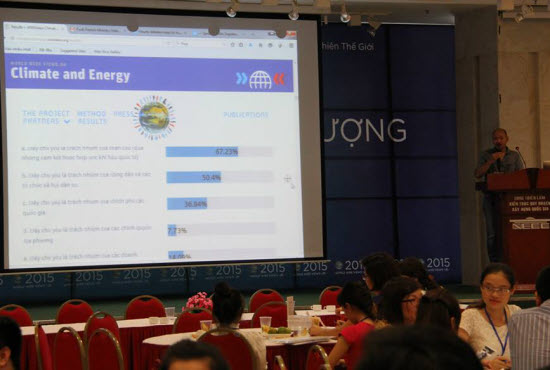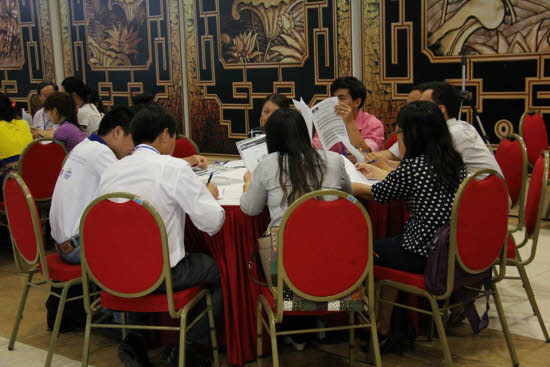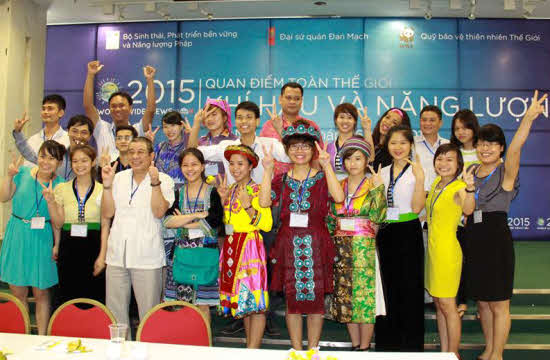On Saturday June 6, 2015 World Wide Views (WWViews), a global citizen consultation initiative, took place in 80 other countries across the globe. In Vietnam the event in Hanoi was co-organised by the Danish Embassy in collaboration with the French Ministry of Ecology, Sustainable Development and Energy and the World Wide Fund for Nature (WWF).
The UN initiative aims to make the voice of ordinary people concerning climate change and energy issues heard by policymakers. In turn, policymakers will engage in international negotiations about future environmental and other issues at the UN Climate Change Conference, COP21, held in Paris in December.

World Wide Views on Climate and Energy is a global citizen consultation, providing unique information about how far citizens around the world are willing to go, in order to deal with climate change and to bring forward an energy transition.
According to the WWViews’s co-ordinators, the core of the method is to have citizens at multiple sites debate the same policy-related questions relating to a given issue on the same day.
The standard is to have 100 voters participating at each site, selected to reflect the demographic diversity in their country or region with regards to age, gender, occupation, education, geographical zone of residency, and membership of environmental organisations.
Vietnamese participants’ opinions revolved around a range of subjects including the importance of dealing with global climate change, measures to address the issue, and Vietnamese citizen outlook on sustainable energies.
On 6 June citizens selected to reflect the demographic diversity attended daylong meetings, starting at dawn in the Pacific, and continuing until dusk in the Americas. The ambition was to involve 10,000 citizens in 100 countries. All citizens received information about pros, cons and views on different climate and energy policies, targets and measures (both in advance and on that day) and all meetings followed the same agenda and guidelines in order to make the results comparable.
Citizens expressed their views on an identical set of questions, designed to reflect policy controversies at the COP negotiations and political discussions about climate and energy in general. The results were published in real-time via a web-tool, allowing for easy exploration and comparisons of results; one country with another, developed countries with developing, etc.

Dealing successfully with climate change and energy transition requires public support. WWViews on Climate and Energy provides policymakers with in-depth and credible knowledge of the level of this support. It does so regarding key issues that are not easily addressed in opinion polls. It thus supplements polls such as Eurobarometer, by providing a credible snapshot of public opinions on some of the more complex issues, that policymakers need to address.
Due to the credibility of the results (citizens have been well informed and been given the opportunity to discuss their views with fellow citizens) they are an important asset to politicians wishing to point out to either domestic or foreign colleagues whether or not there is public support for the position, they are taking. The results reveal whether or not citizens wish to go further than their politicians in setting targets and implementing measures for dealing with climate change and promoting energy transition. This information could and should be used actively by politicians in the public debate, the media, and the COP21 negotiations.
Although the project is not a campaign, it does help raise public awareness about challenges and opportunities. It also sets an example for how to increase the legitimacy and transparency of global governance, by offering ordinary citizens an opportunity for participating in the decision-making process.
The WWViews method was developed to help close the widening democratic gap between citizens and policymakers as more and more policymaking takes place on the global level. Worldwide, different cultural and political traditions and practices for the involvement of citizens in political decision-making exist. At the global level, no such tradition or practice has yet developed.
The methodology is well developed and successfully used twice at the global level (WWViews on Global Warming in 2009 leading up to the climate COP15, andWWViews on Biodiversity in 2012, leading up to the biodiversity COP12). It has also been successfully used for the French national debate on energy transition.
International negotiations about future environmental and other issues are guided by national interests and informed by scientific expertise and advice from various interest groups. No mechanism is in place to allow those ordinary citizens, who are going to live with the future consequences of the political agreements reached (or not), to make their views heard in the policymaking process. As a result, policymakers have no knowledge about the public opinion with regards to the issues they need to make decisions about, and the democratic gap between citizens and policymakers is widening.
It is a network of partners sharing the ambition of making public participation an integral part of global governance. The network was established for WWViews on Global Warming and has now been supplemented with a number of new partners worldwide.

The Co-initiators
The World Wide Views 2015 on Climate and Energy is co-initiated by the United Nations Framework Convention on Climate Change (UNFCCC) secretariat, the French National Commission for Public Debate (FR), the Danish Board of Technology Foundation (DK) and Missions Publiques (FR), with the support of the French Government, COP21 host.
The project is coordinated by the Danish Board of Technology in collaboration with Missions Publiques and the French National Commission for Public Debate and implemented by existing and new partners in the World Wide Views Alliance; a global network of partners including public councils, think tanks, parliamentary technology assessment institutions, non-governmental civil society organizations and universities.
The collaboration between the partners within the network has allowed for considerable institutional capacity building for countries and organizations not previously practiced in citizen participation.
